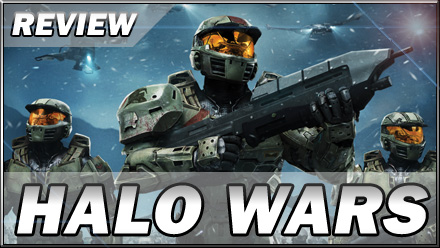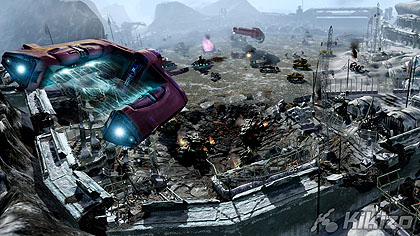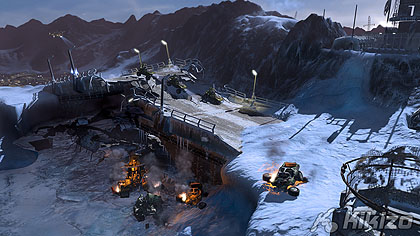Halo Wars
Ensemble's last stand goes under our microscope.
| Version 360 | Developer Ensemble | Publisher Microsoft | Genre RTS |
||||

When Kikizo interviewed Ensemble's Graeme Devine last winter, he told us that Halo Wars would make Halo fans fall in love with the RTS, and RTS fans with Halo. Having finished the 15-mission campaign, we think Master Chief's groupies are well catered for - this is, after all, a game which lets you build your own Scarab - but desktop generals may not be quite so overwhelmed. Halo Wars is an elegant, lustrous RTS which channels the Bungie spirit to great effect, but takes only a few, baby steps beyond the principles laid down in the developer's own Age of Empires series.
While not as meaty as Halo 3, the game manages some respectable bang for your buck. Its 10-15 hour story can be tackled in co-op via Xbox Live or System Link, with two players sharing a single base, and there's offline Skirmish and online multiplayer for up to three participants a side, human or AI or both. Somewhat disappointingly, the campaign mode only gives you the United Nations Space Command side of the story, though the alien Covenant scum are available elsewhere.
Plot-wise there's nothing to write home about. As in previous games, part of the problem is that the script refuses to stay put. The introductory account of the capture, loss and attempted recapture of the colony world Harvest sets the stage for a gruelling war yarn, the crew of the UNSC vessel Spirit of Fire paying dearly for every inch of ground stolen back from the fanatical alien menace. But three missions in everybody rushes off to a resort world to play Tower Defence with a Covenant invasion fleet, and a few missions after that you're frogmarched away to meet the Flood. There's no real effort to pull the threads of the back-story together, either. Much play is made of the Spartans, for instance, but exactly how they fit into Bungie's colourful cosmos is left to guesswork.
The clichéd main cast do little to elicit your sympathies. Captain James Cutter is the grizzled but fatherly general figure, Professor Ellen Anders is an icy but fetching young brainbox who inevitably ends up in hot water, and Sergeant John Forge is a deeply regrettable, tough-talking Neanderthal whose job is to shoot first, think later, and somehow never get himself killed despite forgetting to wear a helmet. Threadbare comic relief arrives in the form of Serina, the Spirit of Fire's answer to Cortana, whose dry sense of humour only underscores everybody else's lack thereof. All in all we'd have been much happier playing the bad guys.
A smattering of A-to-B escort quests aside, the bulk of the missions start with you throwing together a base on a template plonked down at a predetermined point by the Spirit of Fire. Each template has a number of slots on which you can build resource collection, research and construction facilities, all upgradeable, plus four defensive turrets. The template itself can be upgraded to provide more slots, but not indefinitely, and the question is hence not where but what you build using the space available. If you want a steady flow of resource points from orbit, you should build more Supply Pads, if you want to scale the game's technology tree rapidly, you should prioritise Reactors, and so on. Some maps offer neutral facilities which can be garrisoned to cheat your base's limitations, but these are few and far between.











 Satoru Iwata Video Interview - the late Nintendo president spoke with Kikizo in 2004 as 'Nintendo Revolution' loomed.
Satoru Iwata Video Interview - the late Nintendo president spoke with Kikizo in 2004 as 'Nintendo Revolution' loomed. Kaz Hirai Video Interview - the first of Kikizo's interviews with the man who went on to become global head of Sony.
Kaz Hirai Video Interview - the first of Kikizo's interviews with the man who went on to become global head of Sony. Ed Fries Video Interview - one of Xbox's founders discusses an epic journey from Excel to Xbox.
Ed Fries Video Interview - one of Xbox's founders discusses an epic journey from Excel to Xbox. Yu Suzuki, the Kikizo Interview - we spend time with one of gaming's most revered creators.
Yu Suzuki, the Kikizo Interview - we spend time with one of gaming's most revered creators. Tetris - The Making of an Icon: Alexey Pajitnov and Henk Rogers reveal the fascinating story behind Tetris
Tetris - The Making of an Icon: Alexey Pajitnov and Henk Rogers reveal the fascinating story behind Tetris Rare founders, Chris and Tim Stamper - their only interview? Genuinely 'rare' sit down with founders of the legendary studio.
Rare founders, Chris and Tim Stamper - their only interview? Genuinely 'rare' sit down with founders of the legendary studio. The History of First-Person Shooters - a retrospective, from Maze War to Modern Warfare
The History of First-Person Shooters - a retrospective, from Maze War to Modern Warfare